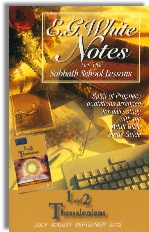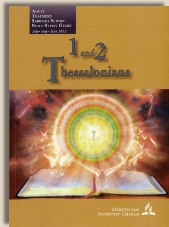|
||||||||||||||
Commentary on "Joyous and Thankful"
Day 3: Monday, July 23, 2012 - God Has Chosen You (1 Thess. 1:4)
Overview
In today’s lesson, the author examines some language by Paul, in two words that he finds troubling: “chosen” and “elected.” If God has chosen or elected us, the author asks, does that mean that we have no real choice in our salvation, even if we want it? After all, some believers take the extreme view that salvation is God’s choice and not ours. They do this so they can take our focus away from lifestyle and behavior. “Such a teaching can also lead to the idea that God’s grace is only for a few and that, once saved, a person cannot choose to be lost.”
Observations
We have to begin the discussion on election recognizing that there are two very basic, very different world views being offered to us. There are many man-centered views of God, and there is a God-centered world view. Dr. Paulien’s world view presents the human choice-centered viewpoint, although he shows no interest in clearly stating the opposing side, and has drawn a very rough caricature of the doctrine of unconditional election, the God-centered viewpoint.
To understand that world view, let’s look at the doctrine of election in scripture and state its position accurately. It begins where God makes an extreme statement—He declares his glory and His name in Exodus 3 as I AM WHO I AM. His name is about His existence: He is what He is without any outside influence or power. Everything else about Him flows from that. In Exodus 33:19, Moses had asked to see God’s glory, so God reveals His glory by stating, “I will be gracious to whom I will be gracious.” He does what He does without any outside power constraining Him, and that is extremely glorious. Without our knowing God’s radical freedom, we will have a weak view of God.
Extreme God, Extreme Mercy
Moses wanted to see God’s glory because he needed God’s assurance of mercy to the stiff-necked, idol-worshiping people Israel. God’s assurance was to show Moses that He was free to be merciful to whom He wanted to be merciful, even the most wicked, idolatrous Israelites. If God had merely said, “I will be merciful to everybody equally,” that would have been of no comfort to Moses. He wasn’t pleading for fairness or equality. He knew that Israel didn’t deserve God’s enduring presence as His chosen people. They hadn’t chosen God; God had chosen them. They didn’t deserve anything good at all, so for God to fulfill His great promises to Israel, Moses needed God’s rock-solid assurance that He wouldn’t treat them like everyone else. For rebellious Israel, He would have to show an extraordinary act of grace—and keep on showing it for eternity. For such grace, God’s freedom to act must be extreme.
So God has to be free from every law, every power, every “watching world” in the universe that might influence Him from being radically merciful to the most wretched of all sinners. God showed His glorious, sovereign freedom when He said, “I will be merciful to whom I will be merciful.”
Therefore, the most important thing in the universe is to understand that God is on His throne and does as He pleases (Dan. 4:35). He is free to show mercy, or not show mercy, wherever and whenever He pleases. He needs no one’s approval to do so. That is the God-centered world view. It is the foundation of His radical grace, and the basis of hope for us, the undeserving.
It’s Not Fair, It’s Grace!
Dr. Paulien is most concerned about our freedom of choice. He asks, “What does it mean that God has chosen or elected us? Does that mean we don’t really have a choice?” Paulien teaches radical free will, the belief that humans have the ability to choose and act independently of all external causation, even of God’s control. Humans, even though corrupted by sin, somehow retain their autonomous will to choose between good and evil, with equal ability (No Place for Sovereignty, McGregor Wright, 1996). We are freely able to choose God, or not, and that is the decisive factor in whether we are saved or lost. Radical freewill is the center piece of great controversy theology.
The Bible teaches us to choose God, on the one hand, while also teaching that God only shows mercy based on His will, not ours. As Paul says, “So then it depends not on human will or exertion, but on God, who has mercy.” His will is the final cause of any good thing that happens within us, because His freedom to act is absolute, and ours isn’t. He chooses first, then He commands us to choose, and we’re still held responsible. But you will say, “That isn’t fair for God to condemn anyone, because no one can resist His will.”
Paul has answered that question, and his answer is very disturbing: “But who are you, O man, to answer back to God?” Who do you think you are? God? We are only clay, and He is the potter, says Paul quoting Isaiah 29, so we can’t question what He does with His creation. To question God’s creation is to reverse roles and put ourselves in the place of God. As He says in Isaiah,
“You turn things upside down! Shall the potter be regarded as the clay, that the thing made should say of its maker, “He did not make me”; or the thing formed say of him who formed it, ‘He has no understanding’? Isaiah 29:16
Role reversal with God is at the heart of great controversy theology, where we judge God, instead of God judging us. Adventists pride themselves in their doctrine of judgment, but they covet the authority of God by wanting to be His judge. In every case where man has tried to be God’s judge, he has always lost. Think of Job, think of Calvary. As our Judge, He has the absolute right to decide the fate of every living thing, and He is always just. He is not a political God, polling the universe and needing our votes. Indeed, that is an upside down worldview.
What About I Peter 3:9?
Freewill enthusiasts quote this text to show that God never had intentions for anyone to be lost, and therefore, there is no such thing as unconditional election. Here is what Peter said:
“The Lord is not slack concerning his promise, as some men count slackness; but is longsuffering to us-ward, not willing that any should perish, but that all should come to repentance.”
This is interpreted to mean that God has willed that everyone will be saved, but because He won’t violate their freewill, most are lost. Man’s will trumps God’s will. If that is true, then God’s gift of freewill has turned out to be a terrible gamble. Most people won’t repent and will perish. We can also ask, why couldn’t God do whatever is necessary to make sure everyone could be saved, such as universalists believe? He certainly is capable of saving the most wretched sinners (McGregor Wright, Ibid). When we answer, “it’s because of freewill” to all the hard questions, we haven’t really answered anything. We’ve also diminished God so that some things are too hard for him. As for II Peter 3:9, it is apparent that God doesn’t want anyone lost. However, out of justice, He has to do things that even He doesn’t desire, like inflict pain (Lamentations 3:33), and punish the wicked. About His decree of destruction against Israel, He tells Isaiah, “strange is his deed!…alien is his work!” (Isaiah 28:21) God is not simple as we imagine, and is very complex in His desires,
But it still seems so unfair. What if we want to be saved, and He won’t let us? Jesus has already answered that question too. We cannot come to Him unless the Father draws Him (John 6:44), and among those He draws, all will believe to eternal life:
“And this is the will of him who sent me, that I should lose nothing of all that he has given me, but raise it up on the last day.” John 6:39
The bad news is, we all begin life spiritually dead. We don’t want to be saved, or submit to God’s rule. There are none who seek after God, who choose God without His interfering with the human will (Rom. 3:11). Our wills are enslaved to our desires, for our minds hate God’s authority (Rom. 8:7). We don’t deserve His particular mercy to us; we all deserve damnation (John 3:18). God is not obligated to save any of us, so our question, “is it fair?” is the wrong question. We confuse our puny standard of fairness with a divine standard of justice. The good news is, no one is able to choose Him, so God’s choosing and calling us must be decisive and powerful, like raising the dead. If you have any inclination for God and choose Him, it is only because He chose you first, and had already raised you to life. Without His grace to you personally, you will flee from Him and remain a rebel forever.
That’s why He can say, “whoever believes in Him may have eternal life.” Belief is the gift that keeps on giving. He can also say, “And let the one who hears say, “Come.” And let the one who is thirsty come; let the one who desires take the water of life without price” (Rev. 22:17). If you hear, and you desire, you can come. Your faith was a precious free gift that your natural self shunned. Thank God that you believe, not because of your superior willing or doing, but because He desired you first and paid the price, long before you were born. If you believe, it’s because He hung on the cross with you specifically in mind. He has the extreme freedom to provide grace to us in Person, as He chooses. This is very humbling, and provides solid grounds for our confidence in Him, and our endurance to the end.
Summary
- When freewill is the decisive factor in our salvation, we have a man-centered worldview. When God is on His throne and does as He pleases on earth, that is a God-centered worldview.
- Israel didn’t have confidence in God’s promises because He was “fair,” but because they could depend on His radical freedom to show mercy to the undeserving.
- God must be free from every law, every influence, every “watching world,” in order to show radical mercy to the most wretched of sinners. We don’t need fairness, we need grace.
- Great controversy doctrine reverses the roles of man and God, by placing us in the judgment seat over God.
- We are able to choose God only after He has chosen us. None of us desires His authority without His radical interference with our wills.
- No one chooses Christ unless drawn by the Father, and of all those that the Father gave to Christ, none will be lost. This makes us both humble and confident.
Copyright 2012 BibleStudiesForAdventists.com. All rights reserved. Revised July 23, 2012. This website is published by Life Assurance Ministries, Camp Verde, Arizona, USA, the publisher of Proclamation! Magazine. Contact email: BibleStudiesForAdventists@gmail.com.
The Sabbath School Bible Study Guide and the corresponding E.G. White Notes are published by Pacific Press Publishing Association, which is owned and operated by the Seventh-day Adventist church. The current quarter's editions are pictured above.
Official Adventist Resources
Standard Edition Study Guide Week 4
Teacher's Edition Study Guide Week 4
Easy Reading Edition Study Guide Wk 4
Search the Complete Published Ellen G. White Writings
Please Support This Project


